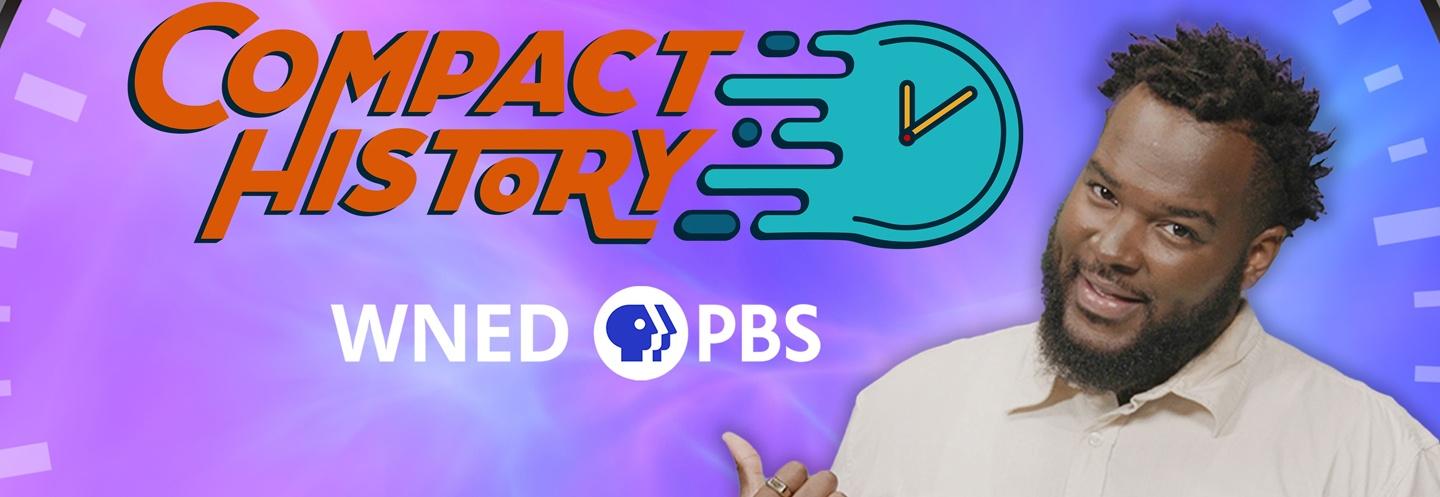
Buffalo Toronto Public Media presents Compact History, an original digital series that connects 4-8th grade students to the stories of the past through the social, archeological, or geographic connections they experience today. The episodes will help young people better understand the relevance of historical moments and begin to see themselves as history keepers and makers.
Compact History lets you follow Cory, a time traveling Middle School history teacher, as he journeys beyond textbooks telling untold stories that transformed our world. From his time portal in Western New York, Cory discovers connections between local historical events and their national impact. You will meet fascinating people along the way and see firsthand how history surrounds you and includes you!
Catch new episodes on the BTPM YouTube channel and on PBS LearningMedia!
Hang out with Cory to learn about the influence of the Haudenosaunee confederacy on the U.S. Constitution, Underground Railroad activity that was carried out in our area AND Canada, how Westward Expansion sparked a fight over fossils known as “the Bone Wars,” how immigration impacted steel production in Buffalo and the outcome of World War II, and more. Compact History unveils how these rarely discussed moments were pivotal to our history.
Watch
Episode 7 | The Truth about the Irish Potato Famine
Reflect on the devastation caused by the "Great Hunger," which reshaped Ireland and the Americas. Cory turns into a potato to explain its significance and Britain's response to the crisis. Years later, Irish Fenians in the United States invaded Canada to seek revenge and independence. Though they failed, this event spurred Canada's push for nationhood. After watching, use the teaching tips, vocabulary, and other classroom activities to explore this topic further.
Episode 6 | Unbought, Unbossed, and Unforgettable: Feminism & The Legacy of Shirley Chisholm
Learn about Shirley Chisholm's life and her enduring impact on feminism. Cory breaks down the evolution of the women's movement, from the struggle for suffrage to Chisholm's groundbreaking presidential run. Her intersectional approach challenged societal norms and paved the way for future generations of activists. After watching, use the teaching tips, vocabulary, and other classroom activities to explore this topic further.
Episode 5 | Chopped Cheese, Yemenis, and Immigration Policies!
Cory and Yroc, an intergalactic alien, showcase the history of Yemeni-owned bodegas, highlighting their influence on US culture. They explore the steel industry’s impact in Lackawanna, New York, and its connection to Yemeni immigration in the 1950s. Over time, tough and ever-changing immigration laws shape industry and society. Understanding these laws is essential to recognizing the essential contributions Immigrants make to America.
Episode 4 | Strikes! Unions! Boycotts! How Migrant Workers Organized for Equality
In the late 19th century, the US was growing in power due to industrial advances and began an age of imperialism. Progressive movements led by labor unions evolved to protect workers, but migrant workers were mostly excluded from advances in American society. In this episode, Cory is joined by a farm worker from the 1960s to explore how the Latiné workforce organized to overcome discrimination.
Episode 3 | What Happened to Freedom Seekers After Escaping Slavery?
Explore the Underground Railroad, and why it was not the end, but the beginning of a new chapter in the struggle for freedom. Life after slavery often centered around churches like The Salem Chapel in St. Catharines, Ontario, where great abolitionists like Harriet Tubman played a key role in helping people stand on their feet. Follow Cory to the “final stop” as he uncovers the power of community!
Episode 2 | Battling for Fossils? How Westward Expansion Fueled Conflict and Competition in the USA
Did Westward Expansion Help or Hurt America?
Explore 19th-century Westward Expansion, from the gold rush to the transcontinental railroad, until Coré—a parallel version of Cory—interrupts. Coré introduces the Bone Wars, a competition between two paleontologists leading to the discovery of dozens of dinosaurs. Cory warns that competition is costly and dangerous, while Coré boasts that competition leads to discovery and innovation.
Episode 1 | Did the Founding Fathers Plagiarize? How Indigenous People Influenced American Democracy
Democracy's Ancestors: The Haudenosaunee Legacy Revealed
Journey to a longhouse and learn about the Great Law of Peace, an ancient telling of the formation of the Haudenosaunee confederacy, the oldest participatory democracy still in existence. Cory, a time-traveling history teacher, reveals that the U.S. Constitution was inspired by Indigenous people!
Meet Cory
Cory McCants is a Buffalo native who began a career in entertainment after graduating from Niagara University in 2011. In 2015, Cory spent a few years in New York City where he seized numerous opportunities to work with Directors such as Ava DuVernay, and companies like MTV and Geico. These experiences have given Cory a unique insight on the importance of following your dreams, whatever they may be. Cory spent 6 years as a performing arts teacher in Buffalo using what he's learned to help teach the next generation of leaders. Cory often expresses his desire to use his talents as a vehicle to spread knowledge, positivity, and laughter to his community and anyone that wants to listen. Compact History is the newest and most exciting project he has the pleasure of working on! Cory says he believes all of his life experiences has prepared him for this opportunity and he is sure he will help make history!
Compact History on PBS LearningMedia
This series is available to educators nationwide on PBS LearningMedia. Each episode is accompanied by several activities that can be completed in the classroom or at home. Activities are directly related to the episode and provide many cross-curricular opportunities. This curriculum was designed with students ages 9-13 in mind but is easily adaptable for those younger and older.